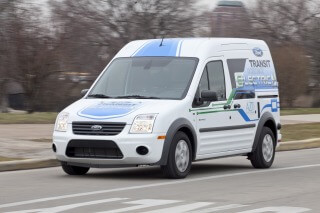 Much of the attention surrounding electric vehicles has been focused on cars like the all-electric Nissan Leaf and range-extended Chevrolet Volt. Ford, meanwhile, has developed a model for those who need more hauling capability by equipping its Transit Connect van with an all-electric drivetrain through a partnership with Azure Dynamics. The Ford Transit Connect Electric is available to both fleet buyers and regular consumers.
Much of the attention surrounding electric vehicles has been focused on cars like the all-electric Nissan Leaf and range-extended Chevrolet Volt. Ford, meanwhile, has developed a model for those who need more hauling capability by equipping its Transit Connect van with an all-electric drivetrain through a partnership with Azure Dynamics. The Ford Transit Connect Electric is available to both fleet buyers and regular consumers.
The Transit Connect Electric is just as refined as the gas-only model and offers improved acceleration, but it comes with a steep starting price of $57,400, about $35,000 more than the base price of the regular van.
One of the most obvious impressions of the Transit Connect when I last drove it was that its 2.0-liter four-cylinder gas engine felt a little weak, especially on the highway, and that was without much in the way of cargo on board. The Transit Connect Electric, by comparison, offers more robust acceleration at midrange speeds and doesn’t feel as burdened by the van’s weight. Throttle tip-in from a standing start is seamless, and the Transit Connect Electric builds speed easily and quietly. The van’s top speed is 75 mph.
Brake-pedal feel in alternative-fuel vehicles often isn’t that great, but it’s remarkably natural and linear in the Transit Connect Electric. Frankly, it’s better than what many conventional gas-engine models offer.
The Transit Connect Electric rides well, too. Like the gas-powered version, it uses a unibody platform that delivers a much more carlike driving experience than traditional domestic full-size vans like the Chevrolet Express. The Transit Connect Electric we drove in Chicago at a Ford event had some cargo in back, and the suspension yielded a comfortable yet composed ride on South Lake Shore Drive, Chicago’s highway along the lakefront. The regular Transit Connect is rated to carry 1,600 pounds, which seems ambitious considering the four-cylinder’s power, but the electric version is only rated to carry 1,045 pounds.
The interior looks much like the regular Transit Connect’s, but it does have a unique instrument panel that includes a range meter and a battery charge indicator. I was expecting some correlation between the two, but with the range gauge showing 50 miles (out of a maximum of 80 miles, according to Ford), the battery meter still showed a full charge. Like the regular Transit Connect, you start the van by turning the key in the ignition and put it in gear by moving the console selector from Park to Drive.
The 28 kilowatt-hour lithium-ion battery pack is under the cargo floor, so there’s no loss of cargo space; there’s still 129.6 cubic feet of cargo room behind the front seats. The Transit Connect Electric accepts the industry-standard charging plug and supports 120- and 240-volt service. With a 240-volt setup, it can take from six to eight hours to replenish the battery pack with the Transit Connect Electric’s 3.3-kilowatt onboard charger.
Despite the stronger performance and familiar driving experience, the Transit Connect Electric’s price tag remains a significant hurdle when trying to make a financial case for the electric van. If you ran a fleet where it could travel 50 miles a day, five days a week every week of the year, you’d rack up 13,000 miles a year. Traveling the same distance in a gas-powered Transit Connect cargo van, which gets combined gas mileage of 23 mpg, would cost $1,820 based on a $3.22 national average for a gallon of regular.
When you count the $7,500 federal tax credit the Transit Connect Electric qualifies for, it still costs $27,865 more than a base Transit Connect. Even if the electricity to charge the Transit Connect Electric were free, it’d take around 15 years to recoup the additional upfront expense. California buyers may be eligible for a voucher worth up to $15,000, which would reduce the payback time to about six years taking into account the state’s higher $3.53 average for a gallon of regular. That’s a big drop, to be sure, but it may still be too long for consumers who have an eye on the bottom line.































